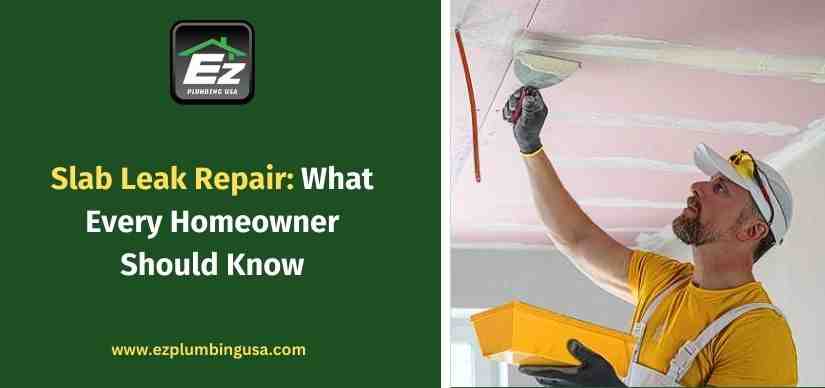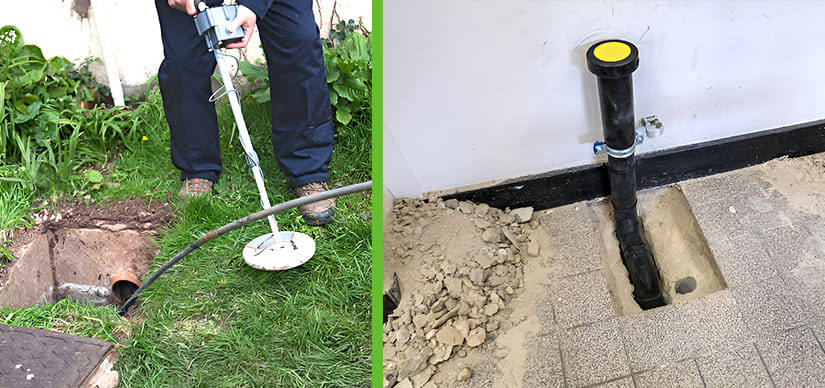Slab Leak Repair: What Every Homeowner Should Know
Views : 758

A slab leak is one ugly plumbing problem that any homeowner could experience. These leaks develop in the water pipes, which run under the foundation of your house leading to potential water damage, high utility bills, and even structural dangers. It is vital to find slab leak repair and detection in San Diego to save both your home and your pocket.
This is a guide that tells you what causes slab leaks, what signs you should watch out for, and slabs leak treatment process schematics. This has all you want when you have slab leaks or if you are just careful whispering about slab leaks.
What is a Slab Leak?
Symptoms of a Slab Leak
- Unexplained Increase in Water Bills
If your water bills get unusually high without any change in usage, it is possible there is a hidden slab leak. - Damp or Warm Spots on Floors
Slab leaks will often raise water up through the foundation, resulting in noticeable wet or warm areas that will be evident on your flooring. - Decreased Water Pressure
One of the prime indicators that there is a leak in your plumbing system (generally below the slab) is suddenly decreasing water pressure. - Mold or Mildew Smell
Slab leaks can keep a constant supply of moisture that can end up growing mold leading to musty smells all over your house. - Cracks in Foundation
The moisture found by leaks will weaken the foundation slowly and will eventually cause cracks and structural defects that will be seen above ground.
Common Causes of Slab Leaks
- Aging Pipes
Throughout the years, pipes may rust or be exposed to fraying. In an older home, the pipes definitely fray or rust the most. - Shifting Soil
Settling or expanding soil under your home can put pressure upon the pipes and cause them to flex, crack, and leak. - Unfit Installation
Poorly installed plumbing systems tend to leak and sustain other damages. - Increase of Water Pressure
Excess water pressure causes excess strain on pipes, causing them to break or burst. - Water Chemical Reactions
Hard water or any bad chemical imbalances can corrode sewerage pipes over time in specific water composition areas like San Diego.
How Slab Leak Repair Works
- Detection
The professionals use specialized equipment such as acoustic sensors, thermal imaging cameras, and pressure tests to find out where the leak is without causing additional damage. - Finding the Leak
After detection, the area might need to be excavated, either by breaking the slab or rerouting the plumbing around the damaged portion. - Repair or Replacement
A complete replacement or repair of the damaged pipe may be done, depending on the severity of the leak, to prevent further issues. - Restoration
The section of slab and flooring affected by repair will then be restored to its state before the repair.
Preventing Future Slab Leaks
- Schedule regular plumbing inspections.
- Monitor water pressure; if high, install a pressure regulator.
- Fix small leaks before they worsen into bigger ones.
- Use a water softener, if hard water exists in your home.
- Seek reputable slab leak repair and detection plumbers in San Diego to assure proper installation and maintenance.
Why Choose Professional Slab Leak Repair Services?
- Advanced detection tools used by professionals locate such leaks destructively.
- Experience and knowledge is what these expert plumbers have so that they could evaluate the extent of the damage and what method is advisable to repair.
- Professionals know that repairs should be done the right way to prevent future leakages and structural damage.
Conclusion
FAQs
1. What does a slab leak actually mean?
There are leaks in the water pipes under the concrete slab of your home when they leak due to aging, corrosion, or earthquakes. It can damage the structure, increase the water bill, and also cause damp or warm spots on the floor; thus, urgent attention is required for this.
2. What are some of the common signs that point toward a slab leak?
The signs typically include an increase in water bills, damp or warm spots on floors, low water pressure, musty odors, and visible cracks in the foundation. If you have any of these signs, you will need to get an expert slab leak detection for confirmation and rectification.
3. How is a slab leak tested?
With sophisticated tools such as an acoustic sensor, thermal test, and pressure testing, plumbers locate leaks without the disturbance of unnecessary digging in the house. Accurate detection ensures efficient repair with minimum damage to your house.
4. Can slab leaks cause serious damage?
Yes, slab leaks can undermine the foundation of your home, create an ideal environment for mold growth, and eventually lead to high costs incurred through structural repairs if not acted upon quickly. The best way to save on costs is by doing early detection and repair.
5. How are slab leaks repaired?
Repair of slab leaks involves excavating the damaged pipe and accessing it or, in some cases, rerouting the plumbing around the leak. Professionals might repair or replace a pipe, reinstating the affected slab and flooring afterward.




